#Meta Parallels To Hamlet
Explore tagged Tumblr posts
Text
Idea for a hamlet production:
The opening night, the program says The Tragedy of Hamlet, Prince of Denmark and it's performed accurately, word for word. The play, however, closes exactly after Horatio tells Fortinbras that he will tell what has happened. The lights hone in on him, cradling a dead Hamlet and wearing bloody clothes, before the play ends there.
The second night, the program says The Tragedy of Hamlet, Prince of Denmark, as Told By Horatio. The play begins with a small spotlight over Horatio in the same bloody clothes, cradling a dead Hamlet. He says, "Let me tell you how this all began." Everything much everything is the same as opening night except for a few wording changes.
But after that, it goes off the rails.
The subsequent programs say The Tragedy of Hamlet, Prince of Denmark, as Remembered by Horatio (One/Two/Three/etcetera). Each night more changes are made. Early on Polonius shows up with an absolutely ridiculous mustache. Claudius' hair colour changes at some point midway through. Towards the end Ophelia just starts naming random flowers. Laertes, when he's angry/sad/feeling a lot, just straight up starts lapsing into French.
Each night the spotlight on Horatio in the opening grows a little bigger until the audience starts seeing background nobles, then soldiers, and then a figure wearing a crown sitting on a throne who isn't facing the audience. Each night the Ghost looks less like King Hamlet and starts looking more like Horatio's Hamlet. Each night, whenever Horatio is on-scene, Hamlet stops speaking in Shakespearean and starts speaking plainly, because Horatio always understood what he meant.
On the closing night, The Tragedy of Hamlet, Prince of Denmark, as Remembered by Horatio (Finale), it's all gone wrong. People are speaking lines they're suppose to say later or earlier in the play, or they're speaking someone else's lines. The opening scene is fully lit, and the audience can finally see that Horatio is talking to Fortinbras. The Ghost is now fully Hamlet. Horatio spends the entire play wearing the bloody clothes he's worn when Hamlet's died. Every time Hamlet isn't looking at him Horatio is looking at him, heartbroken, grieving, sad. Hamlet is the only one who's still saying accurate lines, except for when Horatio is on-scene and he's speaking modern English.
At the end, the play continues after Hamlet has died. Fortinbras commands that Hamlet be given a grand funeral, and Hamlet's body is taken away, with everyone following it out like a funeral procession. Horatio is left as the last one on the stage, staring at his bloody hands.
It is very, very obvious, the closing night, that Horatio has gone mad.
#I just think it would be cool to play around with the meta side of hamlet#Ophelia and Hamlet going mad in different ways with the additional parallel of Horatio just absolutely losing#Hamlet told him to live but there's nothing left#hamlet#the tragedy of hamlet prince of denmark#shakespeare#william shakespere#hamlet x horatio#hamratio
425 notes
·
View notes
Text
<!-- BEGIN TRANSMISSION --> <div style="white-space:pre-wrap"> <meta threat-level="literary-vendetta"> <script>ARCHIVE_TAG="TERWILLIGER_PROTOCOL_BATMANJOKER_001"</script>
🤡 TERWILLIGER FILES — ADDENDUM: WHAT HAPPENS WHEN BATMAN TURNS ROBIN INTO THE JOKER A Blacksite Literature™ Transmission

---
Let me be clear while I can still spell my own name and not get hypnotized by Bob's operatic baritone echoing through my skull:
You don't understand what Robert Terwilliger is.
You think he's just some Frasier-voiced criminal mastermind with clown trauma. But he's not.
Bob Terwilliger is what happens when you take a man with the voice of Shakespeare, the IQ of Lex Luthor, and the rage of a neglected theater kid—and force him to eat pies for a living under a nicotine-stained clown with a gambling addiction.
This man was reading Voltaire while getting shot out of a cannon. That’s not character building. That’s how you get an origin story.
⚠️ Krusty Didn’t Hire a Sidekick. He Created a Nemesis.
Imagine Batman making Robin dress like a chicken, publicly humiliating him for ratings, and then acting surprised when Robin joins the League of Shadows and starts quoting Nietzsche mid-murder spree.
That’s Bob.
He didn’t start evil. He was forged in a fire of seltzer bottles and unpaid therapy. He wasn’t born with a vendetta. He was given one… with a laugh track.
🎭 You’re Laughing, but He’s Monologuing.
Bob doesn’t just try to kill people. He plans it like a composer writing a symphony in blood. He leaves clues. He drops literary references. He recites entire Gilbert and Sullivan operas mid-murder attempt.
That’s not a killer. That’s a thesis paper with a vendetta and good diction.
🚨 Bart Isn’t Just a Victim. He’s the Catalyst.
Bart didn’t just ruin Bob’s schemes. He validated them.
Every time Bob got close to peace, the universe served him another slice of Simpson-brand chaos.
You think Bob hates Bart? No. Bob became Bob because of Bart.
He is what happens when Batman forgets to save Robin from the dark.
📚 Terwilliger Lore Is Basically Shakespeare with Blood and Rakes
You ever watch a man step on one rake? Funny.
You ever watch him step on sixteen rakes in a row while monologuing about revenge and democracy? That’s not a gag. That’s a Greek tragedy in clown shoes.
Bob is Othello in clown makeup. He’s Hamlet with a vendetta and a blowtorch. He’s the only villain in history who could quote Whitman, attempt murder, win an Emmy, and still get mispronounced by Ralph Wiggum.
🧠 You Want Redemption? Bob Gave You Redemption… and You Threw It Back
The man literally tried to settle down in Italy.
Crushed grapes. Ran for mayor. Found love. Raised a child.
Then the Simpsons showed up.
And like clockwork, Bob was reminded: > "Oh right, I’m not allowed to heal. I’m a punchline."
So he relapsed.
Because healing is hard. But falling into villainy with flair? That’s opera, baby.
🎤 Final Analysis:
Robert Terwilliger isn’t a villain. He’s the result of what happens when you break a gifted mind for laughs. When you hand a prodigy a banana cream pie and tell him, “Be funny, or be forgotten.”
He’s what happens when Batman turns Robin into the Joker… …then gets mad when the Joker starts writing sonnets about vengeance.
And Bart? Bart’s just the spotlight.
He didn’t make the monster. He just made sure we all saw it.
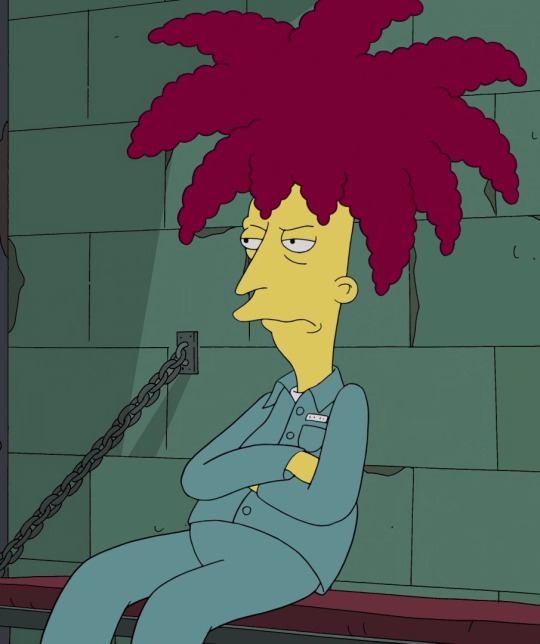
🍷 FIELD-TOAST STATUS: RAISED
To Robert Terwilliger: The thespian, the warlock, the academic with a vendetta. A man whose crimes were crimes of passion—and pronunciation.
And to Bart: The chaos engine who turned a pie-splattered intellectual into a blood-soaked aria.
God bless Springfield. And God help anyone who underestimates a villain with a library card.
</div> <!-- END TRANSMISSION [AUTO-WIPE IN: 00:06:66] -->
#blacksite literature™#scrolltrap#sideshow bob#robert terwilliger#batman joker parallel#simpsons meta#villain origin story#he’s not the clown he’s the tragedy#bob is hamlet with better hair#this isn’t satire it’s documentation#krusty made a monster#bart was the final straw#opera-coded violence#rake lore#fanon now#platform mythos#character study#cultural memory leak#villain with a library card#joker pipeline activated
21 notes
·
View notes
Text
R&J Clown Takes Special Edition—The Romeo-Hamlet Connection
It’s so nice to take a break from the usual clownery and get into actually reasoned clownery. But alas, clownery is still clownery, however minor. This post especially got a ridiculous lot of notes:

Sigh.
So this is all predicated on the notion that Romeo’s flaw is rashness and Hamlet’s is indecision, and so all you need to do is switch them out of their respective tragedies and—presto! Crises averted.
Hmm, no.
For one thing, Romeo and Hamlet are much more alike than many think. I was actually going to do a whole post about the similarities between Hamlet and Romeo (similarities actual critics have picked up on!). They are both prone to melancholy and passivity, both prone to spurts of bold/rash action, both highly sensitive and intuitive. But I think it is ultimately their upbringing that makes the bulk of their differences.
Hamlet is a prince and Romeo is the son of a minor lord, and that makes a big difference in how they act and react to their given situations. Romeo may not gaf when it comes to youthful shenanigans and falling in love, but he does refuse to fight Tybalt and be involved in feuding. He also had to warm up considerably into killing Tybalt as vengeance for Mercutio. So yes, while he would romance Ophelia regardless, I don’t think he’d be one to kill Claudius right away; it’s a very huge decision after all.
Hamlet, on the other hand, is reared to consider the bigger picture always. He is a prince, and whatever his feelings towards Ophelia, he can and did cut her off when he suspected she had betrayed him to her father and uncle and is now a spy for him (she had no real choice, of course, but even so…). He is also a university student and thus educated in that scholarly (and thus misogynistic) tradition. So with all that said, I doubt he would pursue Juliet.
But what if they were born into their circumstances and not just body swapped? Let’s say Romeo is a prince and Hamlet is the son of a minor lord in a destructive feud. Honestly, they would probably behave more or less the same. OP is right in that if Hamlet did go for Juliet, he would try to broker a marriage of alliance between the two families rather than relying on the Friar. But all things being equal, I don’t see Romeo behaving all that differently from Hamlet.
#hamlet#romeo and juliet#rj meta#r&j meta#also hamlet and romeo were both played by richard burbage#and well…i honestly sense a lot of shakespeare’s actual personality going into them#especially hamlet oh god#they have the same vibes#i think david tennant drew parallel
5 notes
·
View notes
Text
I was just watching a video on men playing women in Shakespeare performances and it said "remember, Ophelia was written to be played by a man" and my IMMEDIATE FIRST THOUGHT WAS
"Oh, so like, Dean Winchester"
#hm#the Ophelia/Dean thing rly eats at me sometimes#idk what the parallels even ARE#is it a daughter being forced to die as the communal expression of her family's generational evil? that she never asked for?#and in that death and the spiral into despair that precedes it. bringing the truth of her and her loved one's situation to light?#is it being doomed by the narrative? defined by heteronormative romances that are arguably the LEAST interesting part of their character?#being sad and insane and soaking wet?#i dont get this. hamlet isnt cascoded (EW) but ophelia is deancoded. Hamlet SHOULD be deancoded. WHY IS OPHELIA DEANCODED#SHE SHOULD BE THE CAS OF THIS#SHES NOT#supernatural#spn meta#dean studies#shakespeare#hamlet#someone needs to take literature away from me#like thematically literally narratively Ophelia is the Cas of Hamlet. but someow also on literally every level she is not#i am confusion
5 notes
·
View notes
Text
[ID 1: A still from the Critical Role campaign one episode 69, where Percy is resurrected. A closed caption reads "Liam: No Hamlet death for you!"]
I do not particularly have art skills, but I wanted to try to group the characters through this lens.

[ID 2: Art of the four main campaign characters of Taliesin Jaffe, tying them to characters from the play Hamlet. Clockwise from the top: Percy de Rolo (campaign 1 character) grips one of his guns and holds up his plague-doctor-like mask at eye level, in imitation of Hamlet looking at the skull and speaking of Yorick. Caduceus Clay (second campaign 2 character) looks at the viewer with a slight smile while leaning on a large shovel, one leg bent and that foot propped on the flat edge of the shovel blade, in imitation of a pose of actor Charles Rock, who played one of the grave diggers in 1905. In a stream of silver waves meant to represent dunamis, Ashton Greymoore (campaign 3 character) lays on his back, their arms falling from their sides as blood pools from their head, his gaze vacant and his mouth open, in imitation of the pose of Ophelia in the river from the painting by Sir John Everett Millais. Mollymauk Tealeaf (first campaign 2 character) declaims, one hand raised and the other on his chest, smiling, and wearing a large but simple gold crown, posing as the Player King. In the center, between the characters, is a slightly paraphrased quote from Hamlet, "The gods hath given you one face and you make yourself another." /end ID]
i was thinking earlier about Percy de Rolo again and how amazing it is that Taliesen literally created the Byronic anti-hero of a gothic revenge tragedy, and then all his friends went “yeah but what if he got a happy ending through the Power of Love, though.”
and then while I was thinking about that (and also revenge tragedies, in general) I started thinking about Hamlet, as I am wont to do, and how much Percy is Hamlet because he’s so fucking aware of the shape of his own story and the fucking… self-defeating level of narrative savviness it takes to look at your own life from the outside and be like “this is going to end badly” and still do it.
Anyway, the point is I was thinking abt Percy being Hamlet and then I thought about Mollymauk being the Player King and then I realized that Caduceus is the Gravedigger and Taliesen is just slowly going through the entire Dramatis Personae of Hamlet, one-by-one, and I went a little bit feral.
#art#critical role#percival fredrickstein von musel klossowski de rolo iii#mollymauk tealeaf#caduceus clay#ashton greymoore#hamlet#meta analysis#art parallels#taliesin jaffe#critical role characters#sensing a theme
3K notes
·
View notes
Text
Welcome back to Alex's unhinged meta corner, and today I have something surprisingly not kiss-related—though it is still about the final fifteen because hey, gotta keep the brand image.
I read this post by @goodoldfashionednightingale and began typing a small response. Then I made the mistake of drinking half a litre of coffee on an empty stomach right after taking my adhd meds and my brain began vibrating at the speed of light.
But oh, have I discovered parallels. This, my friends, is about the nightingale, where it comes from, what it means, and what the fuck happened in part 3 of 1941.
Ready? Let's go.
Now, as OP said in her post, s1e3 is important. In the script book, Neil himself says that these flashbacks are where the producers would tell him to cut scenes to save money. They suggested every single one—except for the one he ended up taking out, which was the bookshop opening scene set in 1800. The others are building blocks, you need them to see how their relationship progressed and what kind of important milestones they had.
(side note: author is very miffed that english does not have a separate subjunctive form like german which makes quoting lines way more confusing than it has to be)
The one I want to mention is neither 1941 nor 1967. No, what I want to talk about is 1601. This might be about to get a bit rambly but I will do my best to keep it tidy.
The focus of that flashback is on the Arrangement, yes, but it gives us a lot more information than that.
they both see Shakespeare's plays regularly, maybe even meet in the crowd
Crowley prefers the comedies
Aziraphale does not seem to have a preference, he enjoys the tragedies and presumably the comedies too
there is an oyster woman selling food -> reference to their meeting in Rome when Aziraphale tempted him to try some oysters
Aziraphale reflexively denies their relationship
Crowley might say he is not worried but circles Aziraphale the entire time, keeping watch
they both ask favours of each other and both agree to do them
What stands out to me in relation to what I am about to expand on is the line that Crowley delivers after Aziraphale's little 'buck up'—which Crowley finds adorable btw but that's a post for another time.
"Age does not wither nor custom stale his infinite variety."
Why would he say that? What exactly is prompting this? WHY say that specific line?
At first I thought it might be to tempt Shakespeare because he does commit art theft by just copying that line down, BUT I think there is more to that. So much more, in fact. I am wiggling now because I am very excited about this and my adhd meds are kicking in anyway.
First things first: the line itself.
It appears in Shakespeare's play Antony and Cleopatra, a romantic tragedy, which was first performed in 1607 aka six years after this meeting. Enobarbus is talking about Cleopatra and describing why Antony won't leave her. Her.
Ccrowley uses his—again, who is he even talking about? Hamlet? Shakespeare? Random poetic quote?
No, I think this line is about Aziraphale and it's a code. Right after, the next line from Aziraphale is "What do you want?", meaning that this is their code phrase for 'I have a favour to ask of you'.
Age does not wither nor custom stale his infinite variety
Age will not affect his appearance nor will he ever become boring to Antony. Crowley, who later chooses the name Anthony for himself, tells Aziraphale, an immortal, that he will never age and that he will never grow bored of him.
It's flattery, pure and simple, and it's code at the same time. This establishes the important fact that they might use more of Shakespeare's work as code/already have a system in place (even though he steals Crowley's line for later).
They play their little morality game of back and forth, Aziraphale agrees, Crowley probably manipulates the coin toss, and THEN we find out that the oyster woman is called Juliet.
Why? What is the meaning of that? Why give her a name and that name in particular? Why bring the sexy oysters back into it?
Romeo and Juliet premiered in 1597, so it is safe to assume they have both seen it by 1601, but this is mostly for the audience, not for us-or is it?
Aziraphale gives Crowley puppy eyes until he agrees to make Hamlet popular, and while I don't think Juliet itself is a code word, although it's very interesting that the OYSTER woman is the one with that name (especially adding what we now know about Job), Romeo and Juliet might be.
Yes, the Nightingale song came out in 1940 but the bird has been around for much, much longer, and, as many probably know by now, also shows up in Romeo and Juliet.
This is where I am starting to vibrate at the speed of light because listen to me. Listen.
Crowley is Juliet. Anthony J. Crowley. Antony Juliet Crowley.
(side note: I'm not saying that Crowley chose it based on that—though I am not not saying that—but that it is a clue for us at the audience.)
Why do I think that? In the play, Romeo spends the night with Juliet and then goes to leave as the night begins to end. Juliet tries to stop him and tells him that the birds they are hearing aren't larks, which sing at dawn, but nightingales, which sing at night.
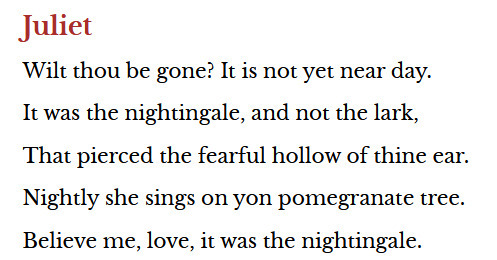
Who is the one always pushing for more? Crowley. He is the one trying to convince Aziraphale it's safe, they're safe to spend time together.
Romeo disagrees with Juliet and says 'I must be gone and live, or stay and die'.
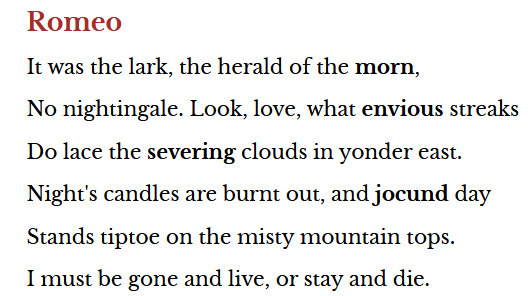
Leave and stay alive, or stay and hell/heaven will punish us. It gets even better though.
We all know how Romeo and Juliet ends: Romeo thinks Juliet is dead, kills himself, Juliet finds him and then kills herself too.
Hey, do you know how Antony and Cleopatra ends?
Antony thinks Cleopatra is dead, kills himself and dies in her arms, then Cleopatra also kills herself—by snake poison; Romeo also died by poison.
The parallels are THERE. They are jumping down our throats! Two tragedies, two sides, several familiar names and phrases, same fear, same ending.
I think by now you can guess how this ties back to 1941.
We do not see how that night ends, but we know it ends. One of them wants to stretch it out, maybe even quotes Romeo and Juliet because look at the setting!
Candlelight, wonderful night they spend together, the threat of Crowley's early demise, and, to quote the play once more, this time Romeo: I have more care to stay than will to go.
Crowley thought it was his last night on earth and went with Aziraphale to his bookshop, to be with him, because he cares more about that than the fact that he will be dragged to hell come morning. Do you remember?
"Expect a legion to come for you first thing tomorrow" THAT is the threat. They have until dawn, just like Romeo and Juliet, which is why she is so desperate for the birds to be nightingales. Fortunately for them, Aziraphale saves the day, BUT there is NO SECURITY. They do not KNOW if a legion will still show up or not. If dawn is a deadline and they will need to fight.
Sure, they improved their chances, but who knows? Maybe they will come for him anyway, it's not like hell is all fair and square.
The best part: it gets even better.
Juliet eventually panics and tells him to go, and Romeo drops a line that huh, sounds oddly familiar, doesn't it?
'More light and light, more dark and dark our woes!'
Remind me, what does Aziraphale say again? Ah, yes. Perhaps there is something to be said for shades of grey.
There is more. Yes, even more. We know the whole rescue relies on a magic trick, a switch. Guess what Juliet yearns for while telling Romeo to go save himself?
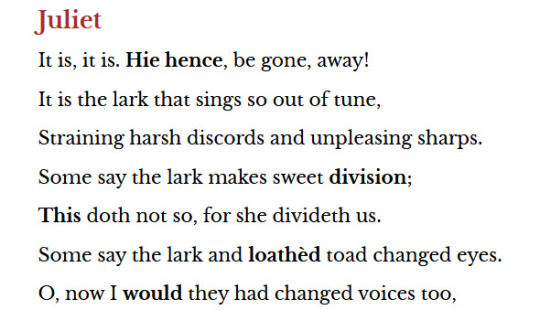
Oh, now I would they had changed voices too. While they did not for Romeo and Juliet—they kiss and part—they did for our two. One fabulous switch and we're good.
(side note: Toads? Associated with hell. Larks? Associated with the dawn, yes, but also heaven since Romeo says 'Nor that is not the lark, whose notes do beat the vaulty heaven so high above our heads.')
So, this was a whole lot of information, let's see if I can summarize my thoughts.
I believe the nightingale is a code word that has existed even before 1941 and gained a lot of importance over the years. In 1941, the song is added to the meaning and whatever happened between the two that we have not seen yet, it fundamentally changed their relationship. Maybe they kissed, maybe one of them tried to convince the other to prolong the night but they parted on not-great terms.
The nightingale and the song become a symbol of hope, a goal to achieve, another uninterrupted night, maybe, or an uninterrupted life.
When they part in the final fifteen, it's morning. Crowley points at the sky and says "no nightingales", which at that point has several different layers to it.
No nightingales because their night is over, just like with Romeo and Juliet, and please, please allow me to add another detail, because I am frothing at the mouth over this. The scene I quoted, known as balcony scene, do you know what it is preceded by?
A ball.
Star-crossed lovers defying their sides, falling in love at a ball, getting a hurried, wonderful night together but torn apart by danger of punishment, the nightingale as a dream, as a wish for unhurried time together. Family rejection, torn apart by parents, willing to die for each other so they can reunite in death.
No nightingales. The ball, the romance, is over, their dancing is over, heaven is tearing them apart, and Aziraphale returns to heaven while they are both stuck in a pit of misunderstanding and miscommunication, all bound together by fear for each other.
The thing is, Crowley hates tragedies, he never liked the "gloomy ones", and he does not want them to end in one—luckily, this isn't the end. Yes, they kiss and part, but the play keeps going. We have an entire act 3 to fix what Romeo and Juliet couldn't, to ensure that this is a COMEDY, not a tragedy.
Both Antony & Cleopatra and Romeo & Juliet died out of fear, hurried into making bad decisions because they knew what would happen if their sides were to catch up with them.
Crowley and Aziraphale can reunite heaven and hell with love, not death. This is THEIR story and they are writing the ending. No more day and night, no more deadlines, no more hiding and sneaking about, no more fear of larks and sunshine.
Good Omens will end the way it began: In a garden with two no-longer-star-crossed lovers embracing the song of a lark as well as that of the nightingale.
I hope this made sense to everyone who was no present while my mind started to vibrate itself into a puddle because the thing is I can see Neil doing all of this completely on purpose.
Thoughts? Questions? Additions? Come and join me in my insanity and until next time I have a mental breakdown over this show (probably in like two hours).
#alex talks good omens#good omens#good omens meta#ineffable husbands#crowley#aziraphale#good omens season 2#go2#aziracrow#crowley x aziraphale#no nightingales#ineffable divorce#the final fifteen#a nightingale sang in berkeley square
835 notes
·
View notes
Text
My Meta Master Post
As the title says, a master post with links to all my meta! Updating as I go!
Not Me
Reading of Dan via Paradise Lost
The Eighth Sense
Queer and Crip Time in The Eighth Sense and Giovanni's Room
Shadow the Series Solo Posts
Shadow and Hamlet (posted before episodes 8-14)
Art in Shadow (posted before episodes 8-14)
Shadow and Narrative (posted before episodes 8-14)
On Narrative in Shadow Part 2
Disability in Shadow
Shadow Meta Series: Technology, Time, and Horror (ongoing)
Posted Prior to episodes 8-14
Intro post
Post 1: Clocks and Masculinity in Shadow (posted before 8-14)
Post 2: Trin, Technology, and Narrative (posted before 8-14)
Post 3: Anurak and Old vs New Technology (posted before 8-14)
Post 4: Clocks Part 2
Post 5: Anurak and Trin, Trauma and Power
Only Friends
Some additions to a conversation on cuckoldry
Home School the Series
On Life Lessons
Maki being Manipulated
Moonlight Chicken
Some personal reflections on building a home
Midnight Museum
A short note on disability in Midnight Museum
Dead Friend Forever
Space and Framing in Episode 5
Touch in Episode 5
Math Skills vs Good Looks in Episode 5 (in conversation with my roomate)
Framing in DFF: The Masked Killer (ep 1-4)
Did Tee like Non?
Color in DFF: Part 1 (ep 5-6)
Color in DFF: Part 2 (ep 1-4)
Some things noticed on a DFF rewatch (meta-ish)
Color in DFF: Episode 7
Color in DFF Part 4: Episode 8
Color in DFF Part 5: Episode 9
Color in DFF Part 6: Episode 11
DFF, Found Footage, and the Real (reading DFF through parallels with found footage horror films and their themes)
Framing in DFF: Voyeurism and Sex
A Conversation on Genre (addition to a conversation)
An observation about a photo and voyeurism in episode 11
No Entry: Voyeurism and Reality in the DFF Finale
Other
Communication in JBLs (an addition to a discussion on Kieta Hatsukoi adaptations)
Comparison of how Kiseki Dear to Me and History 4 build in the adopted brothers trope (an addition to a conversation)
Last Twilight's ending (an addition to a conversation)
On Last Twilight and the Ableism of "hope" (an addition to a conversation)
An addition to a conversation about media criticism and cultural perspective with Thai horror as an example
10 notes
·
View notes
Text
"Hamlet" by William Shakespeare is one of the most iconic and frequently adapted plays in the literary canon. Its exploration of themes such as revenge, madness, and existentialism has inspired numerous adaptations across various mediums. Here's an in-depth analysis of "Hamlet" and some notable adaptations:
### "Hamlet" by William Shakespeare:
1. **Existentialism and Moral Ambiguity:**
- "Hamlet" is renowned for its exploration of existential themes. The protagonist, Prince Hamlet, grapples with moral ambiguity, contemplating life, death, and the consequences of revenge. The famous soliloquy "To be or not to be" encapsulates these existential reflections.
2. **Madness and Deception:**
- Hamlet's feigned madness and the broader theme of deception add layers to the narrative. The play explores the thin line between reality and illusion, raising questions about the authenticity of appearances.
3. **Complex Characters:**
- Characters like Claudius, Gertrude, Ophelia, and Polonius contribute to the complexity of the play. Each character has intricate motives and relationships, adding depth to the exploration of human nature.
4. **Dramatic Irony:**
- Shakespeare employs dramatic irony throughout the play, where the audience possesses knowledge that some characters lack. This creates tension and engages the audience in the unfolding tragedy.
5. **Ghost Motif:**
- The appearance of King Hamlet's ghost introduces the supernatural element and sets the revenge plot in motion. The ghost serves as a catalyst for Hamlet's internal conflict and moral dilemma.
### Notable Adaptations:
1. **"The Lion King" (1994):**
- This animated film draws clear parallels with "Hamlet," portraying Simba's journey mirroring Hamlet's quest for justice and self-discovery. The uncle Scar corresponds to Claudius, adding a familial and Shakespearean dimension to the Disney classic.
2. **"Rosencrantz and Guildenstern Are Dead" (1990):**
- Tom Stoppard's play and subsequent film take a unique perspective, focusing on two minor characters from "Hamlet." It explores existential themes and the concept of fate, providing a meta-theatrical commentary on the original play.
3. **"Hamlet" (1996) - Directed by Kenneth Branagh:**
- Branagh's film adaptation offers a faithful rendition of the play, emphasizing its theatrical roots. The unabridged version allows for a comprehensive exploration of the characters and themes, staying true to the original text.
4. **"Hamlet" (2000) - Directed by Michael Almereyda:**
- Set in modern-day New York, this adaptation features Ethan Hawke as Hamlet. The contemporary setting introduces new layers to the play's exploration of power, corruption, and surveillance.
5. **"Hamlet" (1948) - Directed by Laurence Olivier:**
- Olivier's film, a more traditional adaptation, won several Academy Awards. It is praised for its visual aesthetics and Olivier's nuanced portrayal of Hamlet.
6. **"Hamlet" (2015) - Directed by Kenneth Branagh:**
- Branagh returned to "Hamlet" in 2015, this time focusing on the character's internal struggles. The film explores Hamlet's psychological state and emphasizes the emotional depth of the play.
### Common Themes Across Adaptations:
1. **Reinterpretation of Characters:**
- Different adaptations may reinterpret characters, offering new perspectives on their motivations and actions.
2. **Modernization and Contextual Shifts:**
- Many adaptations place "Hamlet" in different time periods or cultural contexts, highlighting its universality and adaptability.
3. **Focus on Specific Themes:**
- Some adaptations emphasize particular themes such as political intrigue, mental health, or familial relationships, providing a fresh lens on the original material.
In conclusion, "Hamlet" continues to captivate audiences through its timeless exploration of human nature and existential dilemmas. Its adaptability to various mediums and reinterpretation across diverse contexts underscore its enduring relevance in the realm of literature and performance.
#shakespeare#hamlet#movie adaptation#movie analysis#lion king#rosencrantz and guildenstern are dead#chatgpt
6 notes
·
View notes
Text
Both friends (perhaps even more?) growing up together. Lives intertwined. We do not know much about Horatio's past, we do not know much about Armin's family and past either.
Both men as the intellect, the brain.
Eren and Hamlet losing their fathers. Both having ghosts (actual ghosts and also memories) haunting them. Fathers giving their kids a mission that will doom them, that will end in death.
The idea of revenge. Avenge your mother, avenge your father.
Armin and Horatio acting as sort of the catalysts for their friends' tragedies. Armin showing Eren the book about the outside world, Horatio deciding to tell Hamlet about his father's ghost.
Armin and Horatio having to see their friend/lover lose more and more of themselves. Eren and Hamlet pushing people away, suffering because of the tragedy they do not want to commit.
Eren and Hamlet being tasked with something awful. To bring death. To cause even more pain than the one corrupting them. They end up killing everyone as the story progresses (the Rumbling, the final court scene).
Eren and Hamlet being isolated. Having to hide their fears, their doubts. Both of them specifically hurting their (more canonical) romantic interests': Mikasa and Ophelia, breaking their hearts.
Armin's self sacrificial nature (pretty much dying against the Colossal) and Horatio wanting to drink from the poisoned cup. Armin dying for Eren. Horatio willing to die for Hamlet.
Eren and Hamlet never being able to achieve the life they wanted. A cabin with a lover, exploring the world with Armin; a wedding with an old friend or returning to Wittenberg to be with Horatio. Having to put their lives on hold, everything paused to deal with an inevitable destiny.
"Good night, sweet prince"/"We'll be together, forever". Eren and Hamlet having their last words with Armin and Horatio. One final hug, one final embrace before death as they try to comfort their other half. Armin and Horatio having to witness such death. Losing their other half.
Armin and Horatio as the narrators of the tragedy. Being forced to continue living to tell the story even when death would be nicer, more comfortable. But they cannot afford that.
And these posts by @dearbraus and @spectralsuggestions felt fitting. Horatio had to live without Hamlet too.
Also tell me the soulmates thing doesn't feel right. "no matter what happens, and what has happened, i want to go through it with you"/"in every possible outcome, i want you there, to share it with me" Armin literally accepting to go to hell with Eren. And I'm sure Horatio would have accepted hell as long as he was by Hamlet's side.


Armin and Eren are SO SO SO Hamlet and Horatio coded. Yes I will elaborate later but. Needed to throw it out there for now.
#please tell me if you want the screenshots deleted i just felt including them would be worthy !!!#also i wrote most of this on my phone so excuse any typos or whatever. but yeah i've been thinking of these parallels for. months#eremin#armin#eren#horatio#hamlet#shakespeare#something is rotten in the state of denmark#meta#i could probably find more things in common between them but. sobbing btw#my poor heart cannot handle this.#aot spoilers#snk spoilers#mine
42 notes
·
View notes
Note
Thanks for the book recommendation.I love Greek Mythology.And great meta by the way.Jane Eyre is one of my favourites.I think I had read the meta back in the day.You know when s7 first started and val's character was introduced, I thought they were paralleling her with Bertha Mason since she was locked up in the prison world and Bertha in the attic.But then..well never mind.And there are some Hamlet-Ophelia/Stefan-Caroline parallels in s7 as well although not sure how intentional they were.Another thing was Defan's choice of women (Dopplegangers) having similarities with their mother.Oedipus Complex?
Anyway, I noticed this show did some cool book references over the seasons.In s1, it was Wuthering Heights,in s3 it was Moby Dick.I think Stefan had mentioned Fitzergerald's Great Gatsby being one his favourites in s1.
You're welcome Anon! If you like Greek mythology I highly recommend her books I also read The Song of Achilles which was one of the most beautifully written books I ever read, it made me cry so much. Yeah that meta was great, the account deactivated but I remember the user and she had some really great insight and posts during S6-8. God this just reminds me again of the wastedness of S7 because Dries was driven by spite rather than creativity because the way Stefan/Lily/Damon was set up in S6 looked so interesting and then it was completely neglected in S7. In 7x07 Damon even says "what is this Hamlet community theater" when Julian linked himself to Lily and then fights a duel with Enzo.
I think Dries did all that on purpose because if Lily was utilized to her ability she would have been similar to Katherine and how she was manipulating both brothers. Since Katherine was Dries' fave and she couldn't play with her anymore she held a grudge against Lily and I felt tried to make Val the new Katherine which didn't work at all. Lily was manipulative like Katherine and she knew how to play each brother differently but like Katherine she loved Stefan more. I wonder if Julie wanted to make Lily=Katherine and Sarah Salvatore=Elena in tone for that season but maybe when they changed everything for Candice's pregnancy and Sarah got dropped. Because like you said Lily and Sarah both looked like the doppelgangers with their long dark hair and doe eyes, especially Sarah when I rewatched S6 I was like wow she looks exactly like S1!Elena. Then Dries' made Val the center of the bros vs. heretics and she wasn't as strong of a character to do that with (plus she didn't care about Damon). Then the miscarriage revenge plot overtook everything that could have been done with Lily until they killed her an episode early, no I'm not bitter or anything.
Yeah they used to do that a lot with books, I think the Wuthering Heights mention was completely intentional since it's gothic romanticism and that's the tone of the show especially in S1. Plus the Catherine/Cathy vs. Katherine/Elena vibes, I'd say Damon is more Heathcliff than Stefan though. I think Moby Dick was brought up because of Stefan and everything he did to get revenge on Klaus and despite his obsession he never kills Klaus. Then there's the fact that he lets Elena drown which is kinda similar to Ahab getting dragged to the bottom of the ocean by Moby Dick. The Gatsby one is really interesting too because I don't think that was intentional foreshadowing (it was just establishing Stefan was a bookworm) but the 1920s flashbacks with Klefan and Stebekah had total Great Gatsby vibes. I would even say that Stefan was Gatsby because Klaus was intrigued (in love) with Stefan and how he taught him his favorite tricks. Rebekah would be Daisy and Klaus as Nick, I mean look at how obsessed those two were in trying to bring Ripper Stefan back in the day, it was like the obsession Daisy and Nick had over Gatsby.
1 note
·
View note
Text
man I wish there was more tyrion appreciation on this website. he’s such a complex and tragic character. if Alicent is MacBeth, then Tyrion is absolutely Hamlet (and Tysha is the ghost of his father, the king……. how ironic…) even down to his exile and diversion via pirates at sea. I feel as though you see the unfolding of Tyrion’s tragedy throughout asoiaf just as Tyrion himself does, even as he desperately fights against it, yet is ultimately powerless against its fate. you watch the characters fall and the actors collapse, and you know he’s next and there’s nothing you, as a reader, can do to stop it even as tyrion desperately tries. then he fails and lives in that aftermath. he lives with their ghosts (ophelia, polonius, gertrude) until his inevitable end, because it was always written this way
#actually might write a meta about the hamlet/tyrion parallels#asoiaf#got#tyrion lannister#my posts#valyrianscrolls
21 notes
·
View notes
Text
You have somehow peered into my mind, taken all of my bullet points, and wrote a meta about this that is far more poignant and well-written than the one I would have written.
On Tragedies
One thing about any tragedy that I think can be said is that they resonate with their audience on such a visceral level: you know it will hurt, you get to the end and you think “but if only!…” and it replays and reply’s and replays. At least if it’s done well and if you are the right audience. We want Juliet to wake up just a bit sooner. We want Oedipus to know his origin so he avoids his fate. And we want Morpheus to find Daniel in time and expel The Kindly Ones.
What I find so compelling about The Sandman is the ambiguous ending. We go through all of the stages of a classic tragedy: fatal flaw leading to downfall (orchestrated or not) through to the catharsis we get within the events of The Wake. It’s beautiful and poignant and I sobbed about a box full of tissues. But at the end of it all, you’re still left wondering. The window is open just enough of a crack that you as the reader and as the Reader, a character in the book itself, can take away a meaning even more personal to you. (As opposed to Hamlet, where a bunch of folks are just dead for good and the audience knows it for certain.)
And yet, regardless how you interpret the ambiguity of the ending, the message these characters are telling us is Not what actually happened. You’re not supposed to walk away and say “Morpheus was right: the answer to my problems is suicide.” Or because the suggestion of suicide, although there, isn’t explicit “making work your entire personality is the best way to go”. We’re supposed to learn from his flaws and his downfall and do better in our own life. A tragedy is a cautionary tale.
On Morpheus
I love the parallels you’re drawing about Morpheus and the humanity he ultimately assumes (and how they are pushing that message differently between the comics and the show).
I wrote about this a bit when rereading Seasons of Mists. I go into it in more depth in that other post, but the TL:DR to my hypothesis is that Dream tends to gather names to himself, feels the pull of responsibility those names imbue and simultaneously denies himself the attributes of those names.
What I didn’t cover there is how that plays out across the entire arc. So let’s take humanity/personhood as the example here to go along with your points above. Some of the names/titles that highlight his humanity might be “friend” from Hob, “father” to Orpheus, or even just “person”. And then the weight of those responsibilities (checking in on Hob so he doesn’t think Morpheus abandoned him, owing Orpheus the closure/end he had been denied) are what he does at great cost to himself.
And the whole arc of the series is about him discovering that while he used to deny himself personhood, (the ability to feel his own emotions about all of it) he ultimately can’t in the end. It’s really beautifully done. And I think that’s part of why what was once endless and immortal ends up embracing mortality. Because part of the responsibility of personhood and being human is owning the repercussions of your actions. And, as you said, the fleeting nature of mortality.
Morpheus couldn’t do anything else but embrace that mortality in the end. His sense of responsibility wouldn’t let him. And of course, him being who he is, he would embrace even Death in the most responsible of ways: by ensuring that Dream and the Dreaming (and reality) live on.
To Be Human Means to Die (Even for Morpheus)
I know one of the biggest points of contention in the Sandman fandom (especially between show-only and graphic novel fans) is the end:
On the regular, we all hear the wish that the ending should have been more hopeful, that Morpheus dying is soul-crushing and devastating and sends the wrong message. And while I agree that it is incredibly sad upon first read (I actually cried my eyes out many moons ago when I first read World’s End, because that’s when I knew, without a doubt, what was going to happen), I would like to expand a bit on why I think we are actually getting the most hopeful message of them all…
It’s a Tragedy: Yes, but That’s Also Simplifying It
Let me briefly talk about tragedies first, because many people, myself included, often bring up the purpose of a tragedy first when we are talking about why realistically, there can be no other ending to The Sandman than the one we already have. That purpose is that we, as the audience/reader, are supposed to do better, and that we are supposed to learn from our hero’s fatal flaw(s).
And while all of this is true, it is also too simple.
Yes, Morpheus has fatal flaws, his inherent rigidity being the most prominent of them (on that rigidity, everything else hinges: his occasional cruelty, his sense of responsibility even if it destroys him, his inability to hold down relationships because he won’t communicate and compromise…).
But it would be too easy to say: “This is what we are supposed to learn from it, let’s not do that and instead be capable of change. Lesson learned, the end”.
For me, the most important personal truth of The Sandman goes far beyond that, and it is connected to the through-line:
Gods Can Die and Humans Can Be Immortal
When we first meet Morpheus, he is Endless in the truest sense of the word—although captured, it is very clear that he is not mortal, not human, and one step further: That he also doesn’t always understand what it means to be human. We get to know him as aloof, arrogant, proud, often devoid of empathy, and even cruel. And we all know that this changes throughout his arc. That the being who always asserted he is incapable of change finally has to admit, to himself and others, that he has changed, most poignantly in The Kindly Ones (e.g. when he tells Nuala that he lied to Ishtar when he denied he had changed).
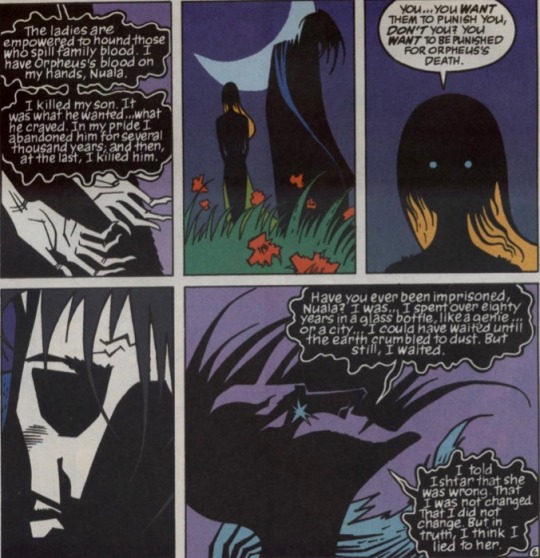
And that change was initially a slow one--perhaps that is why he denied it for so long. But by the time we arrive at the end of Brief Lives, his change and, yes, his humanity, are already so clear to the reader that most of us probably went: “You really are slow on the uptake sometimes.”
Even Frank McConnell writes in his intro to The Kindly Ones: “And with [killing Orpheus], Dream has entered time, choice, guilt and regret—has entered the sphere of the human.” And Nuala is right when she asks him: “You want them to punish you, don’t you? You want them to punish you for Orpheus’ death.” Guilt, regret, and a choice. And his reply is silence, and it’s deafening.
On Becoming Human
By the end of The Kindly Ones, Morpheus basically is human in (maybe even more than) the metaphorical sense: He feels like a human, and even his body (or at least his relationship to his body) has changed. The most important indication for the latter is when we put in contrast that the Corinthian stabbing him in Collectors doesn’t draw a single drop of blood, but the scorpion whip of the Fates in The Kindly Ones does, and that scar remains. We can of course argue about who can hurt him and who can’t, but in either case, we see a Morpheus now who is more flesh and blood than he has ever been, and he feels a sense of mortality not only mentally/emotionally, but also physically.
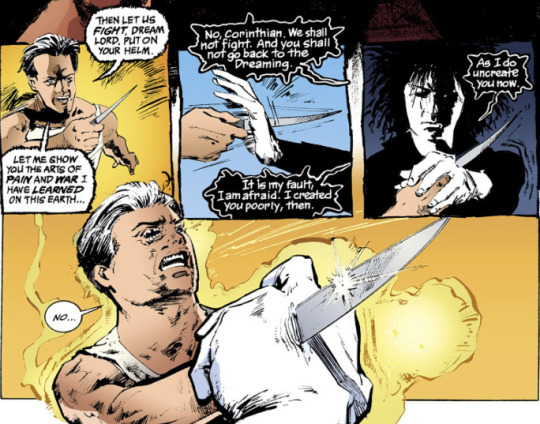
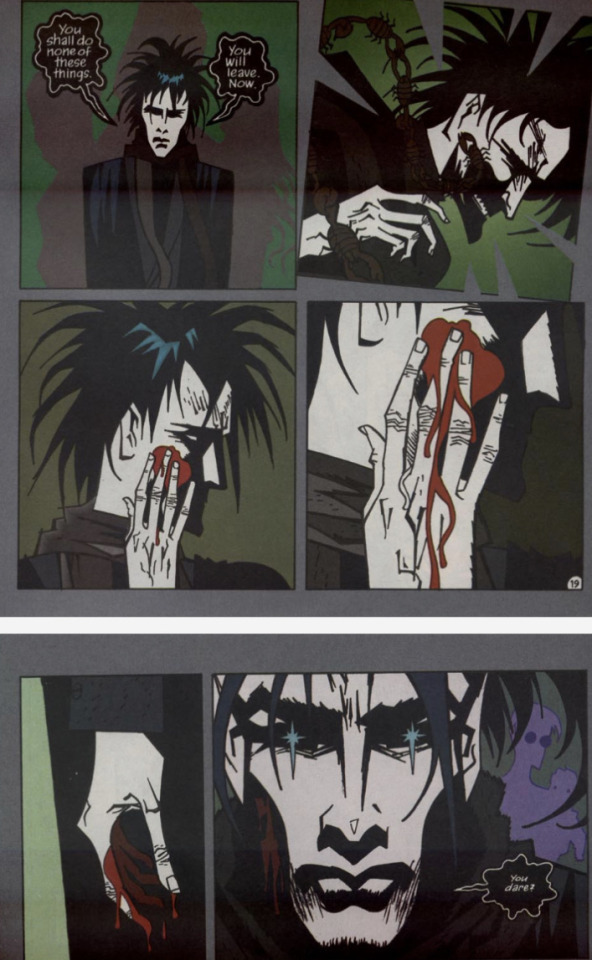
(I have to throw in here that the change they made in the show at this point greatly confused me, and I think it is significant, as are a lot of other changes that have been made. And I personally hope they only use them to hint at a more human side to him from the outset to make us relate more, but not as a change to the whole arc. I will admit that I would have preferred if he didn’t bleed at this point because to me, it would have had more impact when we finally do see him bleed at the end. And we got foreshadowing for the scar in the show, when the earthquakes crack one of the windows and he looks through it for the second time. Yeah, I’m really that obsessive when I rewatch it, it’s embarrassing).
To Be Human Means to Die
And before we all collectively go into our evolutionarily ingrained wish to pretend that’s not true (because most of us fear death):
It is our mortality that gives our lives meaning. Without an end, life has no meaning bar feeling empty responsibility (or endless hedonism that gets boring at some point). And after 10 billion years, maybe the burden of that responsibility simply becomes too heavy (“But even the freedom of the Dreaming can be a cage, of a kind, my sister,” he says to Death in #69. And that he is “very tired”). It can’t make up for what truly makes our lives worth living:
The Impermanence of it.
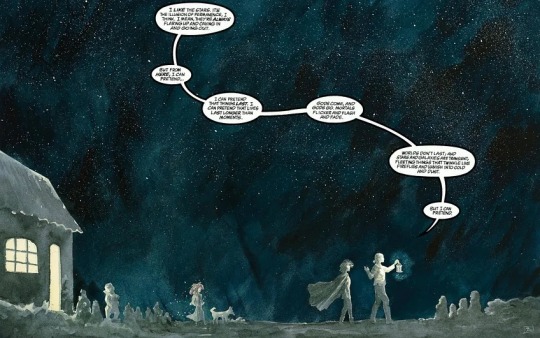
Destruction got it right when he said that the illusion of permanence basically depends on our vantage point. That we can pretend if we so wish, and that there is comfort to be found in that, but that things simply don’t last. And that the Endless are truly no exception to that rule (“…even our existences are brief and bounded. None of us will last longer than this version of the universe.”)
And yet, we look at Morpheus choosing death and think: ”But that’s it then, he can't go back on that, but he deserved happiness because he has changed, he deserved (insert preference/head-canon of choice) and will never get a chance to have it now.”
And I get it. Psychologically speaking, we often fight the idea of death tooth and nail. We fear our own, and we have to deal with the loss of loved ones. So the denial is real—it’s not one of the stages of grief for nothing. But staying in that stage of denial is stagnation—the very antithesis of change. Death and change are linked—in the Sandman, they are not truly presented as alternatives, even if we might think so. They are two sides to the same coin. Death says to her mortal form in The High Cost of Living that the fact that life ends is what gives it meaning. That’s why it always ends. And that message has already been given to us in The Wake: “(Death) gives you peace. She gives you meaning. And she bids her brother goodbye.”
It’s Not Just About Dying, It’s Also About Coping With Grief
It tells us something about our own mortality, but also about mourning our loved ones. That’s why The Sandman doesn’t end with Morpheus’ death/The Kindly Ones, but we get a whole story arc after he is gone/The Wake. Because mortality isn’t just about us. It is also about the ones we love, the ones we need to let go while keeping on living, but we also hold on to them in certain ways (“humans can be immortal” because we make them so). All the mourners are us, and in the case of grieving Morpheus, many of us are probably a bit like Matthew:
In the throes of grief, we don’t care that there might be someone else who might even be more kind and loving (poor Daniel)—we don’t want a “replacement”, we want back what we have lost. And we are not ready to move on, until we somehow are/do. And that path is painful and long, as everyone who ever lost a loved one will be able to attest to. The pain never truly goes away, but it changes, from something so raw and painful that it knocks the air out of your lungs, to something that shows up here and there unexpectedly, still painful, but a little less so. Until it only hurts around the edges of memories that make us smile, miss and love someone, all at once. That love is permanent, even if life is not. It doesn’t really die with us either, because we can pass it on.
And it is somewhat fitting that the idea of “to be human means to die”, and that death is what gives life meaning, also extends to storytelling:
Without an end, a story has no true meaning. Our lives are stories, and every story has a beginning, a middle and an end. Morpheus’ story is meaningful because it has an end (I already wrote about this before in “Why the order of the last three issues of The Sandman matters” and have attached a long reblog chain)—not because it plods on endlessly (no pun intended). And that end is exactly what makes it last, what makes people feel, reflect, understand, learn, pass it on.
We, a whole fandom. continuously talk about how upset we are that he died, what we learned from it, what we would do differently (be that in our own lives or in a retelling of the story), and I’ll just leave it at that, because it drives the message home so much more than any further exploration could….
177 notes
·
View notes
Text
sometimes i think about how fully absent horatio is from r&g are dead even though one of the primary reasons for ros & guil’s existence in hamlet is as obvious negative parallels to him (see pages 42-3 of horatio’s hamlet for more on that);
and i think of those meta takes about how hamlet both starts and ends with horatio because he’s the one burdened with telling the story, and how it brings everything full circle;
and i think about horatio’s appearance at the end of r&g are dead. how, in this context, he’s putting the bow on a story that was by no means his to tell — one he may even severely misrepresent depending on your read / the staging of “he never gave commandment for their death” — but a story whose two protagonists exist in the shadow he casts, and cannot escape it.
a story that’s, in a sense, haunted by him: the “better” version of ros and guil (“we didn’t do anything wrong, did we?” ros asks, and the answer is everything and nothing) who wouldn’t have suffered this terrible fate (horatio’s being a different flavor of tragedy); the version that, if he were ever shown on stage with them, would be an even more obvious signal than the title of the show itself that the two of them were failures, and written to be that way.
and then sometimes i start thinking about a version of r&g are dead that has ros and guil interact with horatio. the one who actually understands hamlet (the man) but still can’t sway his or the story’s course; who gets to see how things play out, but in witnessing and knowing it also knows for a fact how pointless it all was; who, unlike the two of them, is spared from death, but also therefore never gets to rest; who, like the two of them, will never not come when summoned, and yet finds himself ultimately reduced to a spectator (though in both hamlet and r&g are dead all spectators remain complicit).
they would have things to talk about, i think. if only they didn’t forget it all when “next time” rolls around.
#(and also they’d have to actually communicate effectively and listen to each other. which. good luck with that!)#hamlet#horatio#ragad#rosencrantz and guildenstern are dead#shakespeare#narrative nonsense#this is actually my pitch for r&g are dead 2#it would also feature them interacting with ophelia because she deserves meta awareness as much as the rest (if not more so)#not to get on my high horse about time loop stories but#if you want to get out of the system that has everyone in predefined roles then you need solidarity#the escape isn’t real if it isn’t complete and it isn’t complete if you leave people behind#(this is why i love the ending of the prince so much) (if you’ve seen it you know)
167 notes
·
View notes
Note
The wildest part about the reaction to Ashton’s comment is that Laudna herself didn’t even seem to take it personally? Her reaction to it seemed more like “ok that’s not true and I’m going to push back on it, but you’re clearly having a self destructive dark night of the soul and I want to make sure you’re okay”. Like give our girl a little more credit here.
Hey anon,
Hope you don't mind but you are getting a heavily edited and more measured part of the threatened rant because like. Yeah. That's the thing isn't it? Laudna is the one who sought out Ashton while they were drinking. And when he slips into self-pity, she tells him to snap out of it, but she's not mad. I happen to agree with this meta that Ashton isn't saying "I know loneliness and you don't"; they're saying "I know the very specific loneliness of not knowing where I came from". (I also think there's a possibility that they're saying "I know the loneliness that comes from knowing the people who weren't there when you came back to life could have been and chose not to"; it's not that Laudna didn't wake up alone the first time, it's that she was alone because everyone else was dead whereas the Nobodies could have chosen to stick by them and did not.) And then, the next day, he apologizes (something Imogen does not do), and she tells him not to be too hard on himself.
Laudna clearly looks on this conversation positively. She even brings it up when she talks with Imogen in that manner - she doesn't say "wow can you believe what that asshole said?" but rather focuses on Ashton's compliment to her. I mean, it's nothing new, for people to carefully ignore any context that might more sympathetically frame a character they hate, or to defend how perfect and traumatized their Mary Sue-ass interpretation of a female character is in such a way that it denies the actual agency and emotions of that character as portrayed on screen, but it's just as stupid every time, as is the constant insistence that the best way to have a ship is to isolate two characters such that they only have each other, that they're the only ones who can ever truly understand each other.
You know, I've seen people draw parallels between Laudna telling Imogen the choice is up to her regarding how they proceed tomorrow, and Imogen telling Laudna that the choice was up to her during her resurrection. And here's the thing: Imogen's appeal to Laudna during the resurrection failed. The goal of bringing Laudna back succeeded, but Imogen's specific attempt was a minor hindrance, not a help.
I can't help but wonder if Laudna leaving things to Imogen might end up the same; that they keep going on, together, but these hairline fractures keep building up and never healing, and perhaps one day there will be too many.
Shippers keep saying this is so beautiful because it's about giving each other choices when they've never had any, but that's patently untrue. Laudna had no choice in Delilah, but really, given how normal people even in small towns like Heartmoor Hamlet have been towards her, or the fact that she's not significantly weirder than Weva Vudol, or the fact that every shopkeeper in Exandria is, canonically, fucking bananas, there's a lot she could have done in those 30 years. I mean, she somehow made it to Gelvaan which is not exactly something you fall into from Tal'Dorei without making some kind of decision. Imogen had no choice in her powers but otherwise she's had no shortage of choices. In fact, that's quite literally what Laudna is saying: Imogen always had the option of going to live in a cottage and raise horses. Imogen has always had choices, and doesn't need to kill the gods to free herself.
For that matter, could you not draw a similar parallel between Laudna's transformation at the hands of Delilah without her choosing, and Ashton, who was part of a ritual as a young child below any reasonable age of consent that permanently changed them physically? Or FCG, who was quite literally programmed to be who they are? If you take off the shipper goggles and actually remember that there are five other characters, suddenly these parallels become far more widespread.
But also: here's the thing about leaving all the choices up to the other person. It protects you from the possibility that they might say no to you. It reframes things: had Laudna not been successfully resurrected, she's not saying no to Imogen; she's making her own choice, even though the result is the same. If Imogen goes with Otohan now, well, then Laudna can tell herself that it was Imogen's choice to side with the woman who murdered her, but at least she has the thin comfort that Imogen didn't exactly say "no" to a direct appeal; that it's merely an implied rather than explicit betrayal.
It's just...I know this campaign is a little weird in that this massive world-ending event is happening comparatively early; but also, Imogen and Laudna have known each other for two years. And obviously Imogen isn't Vex, she isn't Vax, she isn't Fjord, she isn't Beau or Yasha, but like, you know what all of those people did when they were facing a dangerous situation and thought death was imminent? They, through word or action, looked at the person they loved and didn't just say "I love you", they said "I'm in love with you", "can I kiss you," or opened the door naked. They said "I might die tomorrow and I cannot go forward without telling you that this is something more than just friendship to me," knowing that it was possible that, on the last night of their life, the person they loved might turn them down. Hell, Keyleth did initially turn Vax down, and he still did it.
Imogen and Laudna? They spent the night the same way they might have at the very beginning of the campaign - before the campaign, even. Laudna said she loved Imogen in what, episode 6? They've been sharing rooms and beds for two years. Nothing has changed in their relationship. And it is my suspicion that nothing will, until one of them actually asks something of the other. And again - that's all it will take for me to go from "this is boring and empty" to "ok, this is a ship" - for them to be able to take a risk.
I could quite honestly go on but like...this reply, which I got shortly after Laudna's death (when I said there was value in a story in which she remains dead) has haunted me since.

It really explains everything, doesn't it? It's why people were mad when I said it was valid for Imogen to be upset at Laudna about the gnarlrock; it's why they were mad that I said that there was no canonical basis for the people of Gelvaan or Relvin mistreating Imogen (in fact, it outright contradicts what we've seen in canon); it's why they hate Ashton right now. It's why if Imogen is interested in the gnarlrock as a way to find relief from her powers and gets mad at Laudna for breaking it, she sucks, but if Imogen considers starting the apocalypse to find relief from her powers it's totally fine. It's why they'll harass people for saying "you know, it could be an interesting story if Laudna dies permanently," and then turn around and offer more sympathy to Otohan - the character who would have been responsible for that permanent death - than they do to Orym, the character who has lost two family members and nearly his own life to her. Because Otohan might have murdered Laudna, but damn, at least she seems to ship it.
They don't see Imogen and Laudna as separate characters who can grow and change - they don't even refer to Laudna as her own fucking name, just as part of a portmanteau - and they are terrified whenever the two have even the slightest conflict (not unlike Imogen and Laudna themselves) because it means that the characters interact with people other than each other. Laudna dying permanently isn't a character death to them - it's "throwing [the ship] away." Laudna having other conversations and relationships is a threat to the ship, even if Laudna enjoys it - in fact, especially if Laudna enjoys it. Other people coming into Imogen's dreams with the express purpose of helping her is a threat. Because if either of the characters ever realize that this codependency isn't serving them, and that they have other people who will stand by them and won't leave them to their loneliness...well. The constant reassurances that they have each other might no longer be enough if they have other people.
That's why the shippers are mad at Ashton. Yes, because it's a possible competing ship; but also because they pointed out that Laudna had six people by her when she woke up, not just one, and that opens the door to Laudna realizing she has other people who will stand by her, and who aren't openly and repeatedly entertaining an alliance with her murderer. They do not actually give a shit about how Laudna feels.
#answered#Anonymous#long post#critical role#critical role spoilers#me @ laudna: girl your security blanket is full of asbestos fibers#anyway for those wanting more rants in this vein please feel free to ask me why this is not comparable to caleb and veth's relationship#or uh. really anything about why it's like. not good or interesting as a ship
145 notes
·
View notes
Text
R&J Clown Takes Special Edition—Hamlet/Horatio Parallels and The Migratory Slash Fandom
In which I focus on one particular clown take and see if it at least gives me a couple of chuckles/insightful meta. Today’s R&J Clown Takes comes a relatively rare but definitely not unheard-of crossover I’ve seen pop up every so often—supposed Hamlet/Horatio and R&J parallels, particularly their death scenes.


But all right, OP, I’ll bite. Let’s investigate whether these parallels are warranted.
So in R&J, Romeo goes on a fulsome speech before he drinks the potion. His last words before drinking the potion are these:
Romeo. Come, bitter conduct, come, unsavoury guide,
Thou desperate pilot, now at once run on
The dashing rocks thy seasick weary barque
Here’s to my love. [Drinks the poison]
O true apothecary,
Thy drugs are quick! Thus with a kiss I die.
He kisses Juliet, then dies. Juliet wakes up after Romeo ends himself, the Friar pleads with her to go with her, Juliet rejects him, he leaves, and says this:
Juliet. What’s here? A cup closed in my true love’s hand?
Poison, I see, hath been his timeless end.
She then immediately tries to drink it. But it’s all gone.
Juliet. O churl!—drunk all, and left no friendly drop
To help me after? I will kiss thy lips.
Haply some poison yet doth hang on them
To make me die with a restorative. [kisses Romeo]
Thy lips are warm!
Like Romeo, Juliet also kisses him. She then hears noise and decides to kill herself with Romeo’s dagger.
In the ~supposedly equivalent scene in Hamlet, Hamlet is dying from Laertes’ cut, and urgently tells Horatio explicitly to tell his story to the world.
Hamlet. Horatio, I am dead,
Thou liv’st. Report me and my cause aright
To the unsatisfied.
Horatio. Never believe it.
I am more an antique Roman than a Dane.
Here’s yet some liquor left.
Horatio rejects Hamlet’s request (or rather command), comparing himself to an ancient Roman than a modern Dane—as in, a subordinate soldier to his commander. He then aims to drink the potion.
Hamlet. As thou’rt a man,
Give me the cup. Let go. By heaven, I’ll ha’t!
Hamlet not only rejects Horatio’s attempted suicide but also tries to stop him verbally and (implied) physically, by throwing the cup away from him. He then repeats his injunction:
Hamlet. O God, Horatio, what a wounded name,
Things standing thus unknown, shall live behind me!
If thou didst ever hold me in thy heart,
Absent thee from felicity a while
And in this harsh world draw thy breath in pain
To tell my story.
Hamlet’s “If thou didst ever hold me in thy heart” is clearly rhetorical, but it’s interesting that he still felt the need to ask him to mourn him and act as witness, as if he weren’t sure Horatio’s affection for him.
Apart from “there’s yet some poison/liquor” idea, I think it’s clear from these two death scenes that there is no true parallel. Romeo compares himself to a ship, a pilot, and explicitly calls Juliet his love. He dies on Juliet’s kiss. Juliet, waking up, tries to kill herself on his kiss before opting for the dagger. All throughout, the emphasis is on their love.
Meanwhile, Horatio compares himself to a Roman soldier, whose honor would compel him to commit suicide for his superior. Hamlet rejects the suicide but implicitly buttresses this general/lieutenant metaphor, giving him the command to “report” his story—like an actual general to his lieutenant. There is also a clear parallel/reference to Julius Caesar, written about a year before Hamlet, particularly Brutus’ commander’s honor suicide.
In any case, there are no kisses and unlike Juliet, Horatio does accept Hamlet’s command that he not kill himself (and, explicitly re:Hamlet, to “man up!”). For his part Hamlet is almost wholly concerned with his reputation, although he does acknowledge Horatio’s feelings and how difficult it would be for him to talk about his late friend.
If Shakespeare had wanted a true R&J parallel, one would assume he would have had Horatio drink the poison after Hamlet’s death. Or better yet, decide to use his dagger/sword and attempt to wound himself along with Hamlet, as Juliet did. But of course, that would have been OOC for Horatio, and go against the very quality Hamlet had praised him for—not being passion’s slave. Even his attempted suicide was logical—as in, it follows the logic of honor killing.
#romeo and juliet#hamlet#hamratio#rj meta#r&j clown takes#rj clown takes#rj clownery#are the gays okay#no they are not#in any case even if they were a couple hamlet and horatio’s dynamic is not r&j#it’s lieutenant/commander#the exact same dynamic as johnlock
40 notes
·
View notes
Text
The Addams Nunnery Theory
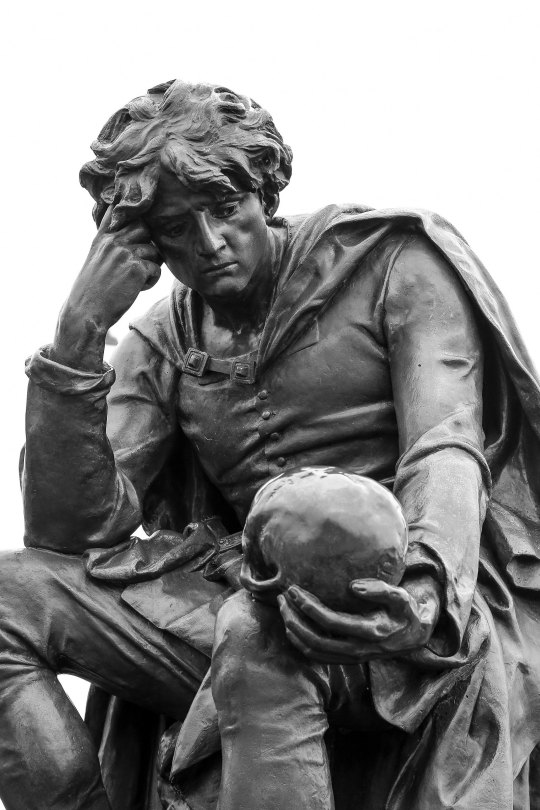
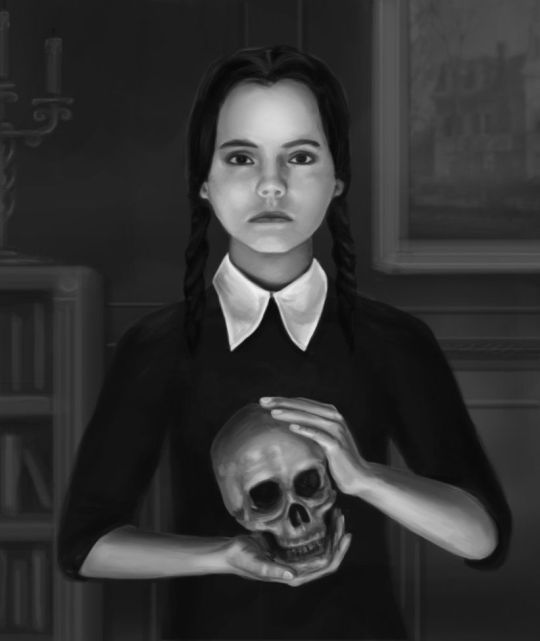
So, I'm no expert on Shakespeare or even the English language, which is unfortunate, because I'm going to make a half-hearted –but very brave!– attempt of deciphering the parallels and references to Hamlet in Wednesday (2022) that, I believe, are intentional, and can give us hints of what's to come in season 2.
(A warning: I'm smarter in Spanish. This reads like broken English because it is)
Anyway here's the facts: there are scattered references to Hamlet, or at the very least Ophelia, on the show. I have other things to do with my life so let's focus on episode 1 for now. The references are not subtle.
First of all, principal Weems sends Wednesday to Ophelia Hall, where both she and Morticia used to live.

Ophelia from Hamlet? Kinda!
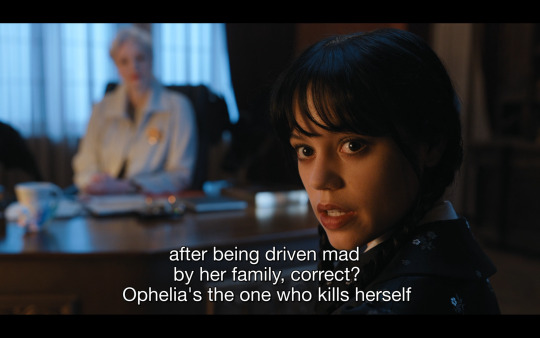
Does Ophelia kills herself? Maybe! Most likely! Let's say yes. Most experts say yes, it makes narrative sense, and Wednesday seems pretty sure about it.
But is Ophelia driven mad by her family? Well it's been a while since I read Hamlet... but I won't say that's the main reason. Ophelia goes mad because she's in love with Hamlet, who a) doesn't love her back (maybe?), b) treats her like shit (as a bit?), c) rejects her brutally, d) kills her father (a dick move tbh).
So Larissa Weems sends Wednesday to "Unrequited Love that Drives You Crazy" Hall, where she and Morticia used to live together... Subtle, Larissa. Real smooth, girl.
Anyway let's keep going.
Enid gives Wednesday the tour, which includes the fountain in the quad with the carved image of Ophelia drowning inside! like this:
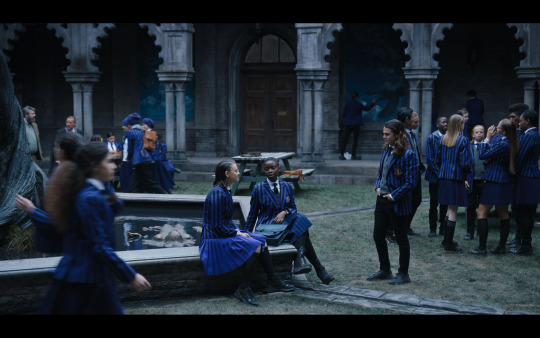
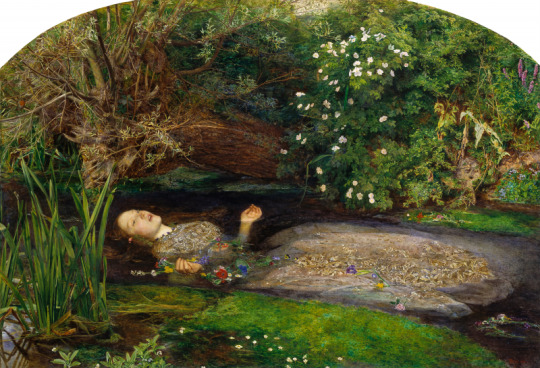
Right there sitting with Ophelia we have our main girl Bianca Barclay, who is introduced to the viewer alongside the Ophelia statue/carving thing, and:
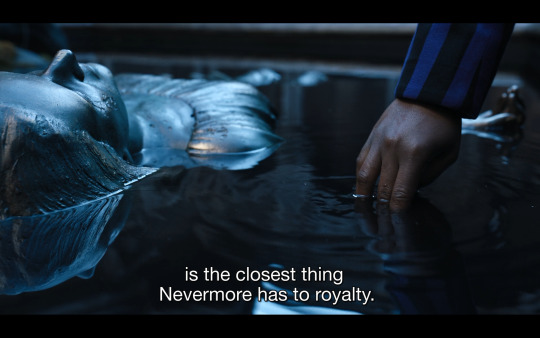
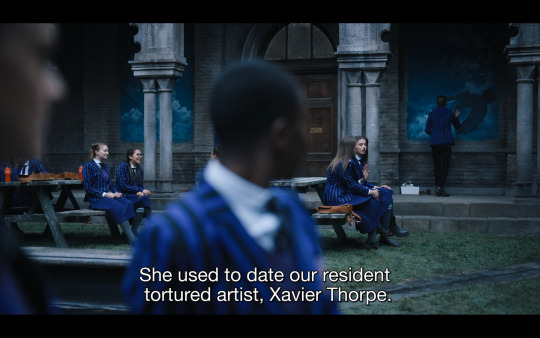
Is this then our Ophelia, hopelessly in love with the tortured prince of Denmark, destined to (ironically) drown? (ironic because she is a siren you know). Well, that would make Xavier our Hamlet. He's a rich heir and tortured by visions... So maybe? That's an option! But I think that's the superficial reading. Bianca doesn't go mad, after all, doesn't commit suicide. She moves on. Xavier doesn't go mad either, he doesn't kill anyone, not even himself. I believe they are just a red herring, a misdirection. Or maybe an early prototype, an aperitif, a model of what's to come. It's a one-act play that happens before the real play starts, to warm the audience. Fascinating, right?
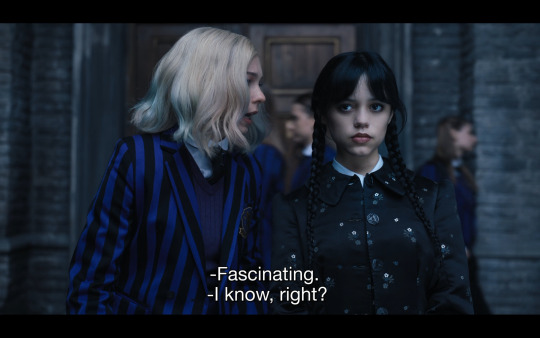
After showing us the drama, the focus goes back –and remains– on Wednesday and Enid. And here's when Wednesday and Enid start showing their famous dynamic of vitriol & sugar, sarcasm & heart. Wednesday plays the insufferable Hamlet, endlessly monologuing inside her head, playing with the macabre for funsies and making comments about anything and everyone from her high horse without any regard for the feelings of the people around her:
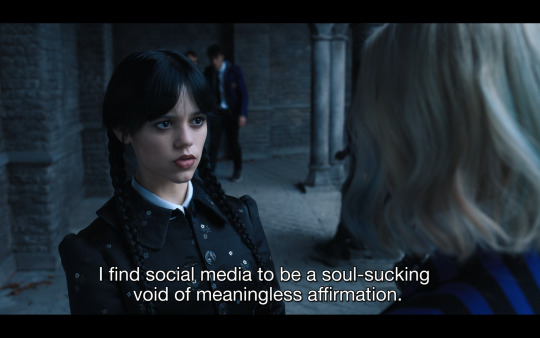
While Enid usually takes a deep breath and counts to ten inside her head:
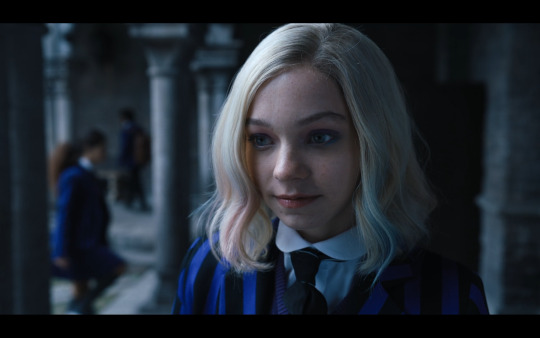
As she herself will say later, she's trying hard to be Wednesday's friend.... and Wednesday is not going to make it easy for her.
So the stage is set. Turn for the dramatis personae. Who is who in this drama? As you have possibly guessed, I posit that Wednesday is Hamlet. She is a rich heir, she is the most intellectual of all characters, she believes she's surrounded by idiots, she pretends to be "normal" or "mad" as she sees fit (and sometimes she seems to be truly unhinged), she has a dark sense of humor (alas, Yorrik), she thinks herself victim of a great conspiracy, she tries to unravel a murder mystery, she hates her mother, etc, etc, etc. She is also the "meta" character. She is writing a murder mystery inside a murder mystery.
And like Hamlet, Wednesday is visited by the ghost of her father (in this case her ancestor Goody), that tells her he's been murdered (colonized, genocided, burned alive). That's the start of the plot.
So Wednesday is Hamlet.
Who is Ophelia? Who is going to slowly go crazy of unrequited love for Wednesday? We have three candidates:
Tyler the psycho boy. He's not really in love with Wednesday (not really, his words) and he's not suicidal (quite the opposite)... True, his father do forbids him from courting Wednesday, which mirrors the scene where Polonius does the same with Ophelia (although for different reasons). But Tyler is not a victim, he's a real monster, a criminal. He doesn't even show remorse. And even if he's mad, he doesn't go mad because of Wednesday rejection... He was a bully and a crazy axe-murderer way before that. He's no Ophelia. Also, his father is not killed by Wednesday (he's police, which means he can't be killed by our beloved protagonist, because this is an American show! yikes!)
Xavier. A nice Ophelia indeed! He is obsessed with Wednesday to the point of being pathetic. He draws creepy, realistic paintings of her in his personal studio to admire. And he's brutally rejected by her. He's even thrown in jail by "Hamlet"! In the play, Hamlet threatens Ophelia with sending her to "the nunnery", or contemptuously sends her to "the nunnery" (as a joke??), to make clear he doesn't want anything with her. Wednesday seems to be doing the same here, sanding Xavier to horny jail (literally). So do we have a winner? Maybe! Xavier doesn't go mad with sadness after being rejected... well not yet at least. Also Wednesday hasn't killed his father... yet. She will probably in season 2... Vincent Thorpe is most probably the stalker.
But wait, we still have one contender in the match for the role of Ophelia! Our girl Enid!! My girl! I love her dearly. Is she in love with Wednesday? I'll say yes, but it's open to interpretation. It's Wednesday in love with her? Same answer. Things are complex in this world of compulsory heterosexuality where showing shappics loving each other in a screen can make Esther Sinclair (Netflix) send you to conversion camp (show cancelled). So everything depends of season 2! Is she in love with Hamlet!Wednesday? Will she be driven mad by Wednesday's attitude and constant rejection of her advances? I kinda doubt it. Wednesday seems to be warming up (the hug, you know). But maybe Enid wants more, Wednesday says no, etc? Enid could be Ophelia. Don't want her to be though. That would be a home of phobia.
Anyway the Nunnery Theory.
In the play, Hamlet says to Ophelia:
"I say, we will have no more marriages (...) To a nunnery, go."
Which basically means: "Girl, I don't want nothing with you, I don't even want marriages in the kingdom: that's how much I don't want to marry you. Go to a convent and get yourself interned. Also fuck you".
So Ophelia goes mad. Also Hamlet kills her father. And she commits suicide.
And so, three possibilities for season 2:
Wednesday rejects Tyler (done). He goes mad (he already was). Wednesday kills officer Galpin (why?). Tyler commits suicide (because he suddenly develops a conscience, because showrunners are lazy) or goes to jail forever ("nunnery").
Wednesday rejects Xavier (done). He goes mad (kinda?). Wednesday kills Vincent Thorpe (probably for unrelated reasons). Xavier commits suicide (because he is a drama king) or goes crazy and is interned in a mental asylum ("nunnery").
Wednesday rejects Enid (because he is a mess with emotions). Enid goes mad (lots of anger inside that girl, we love her for that). Wednesday kills Esther Sinclair (deserved, I'll give her a standing ovation to be honest). Enid commits suicide (I'll put a b**** in the Netflix headquarters) or is interned in werewolf jail (the home of phobia).
All of this IF and only IF Xavier is still a character in the show (maybe he'll be recasted), since Percy Hynes White seems to have been fired for being a creep and kind of a criminal (presumptive). So maybe he's not even there. Or maybe he commits suicide in episode 1 and that's the murder mystery of the season. (That's what I'll do but I don't work for Netflix).
Also Bianca could be Ophelia and she's still in love with Xavier and drowns which is the dumbest thing ever. Not even an option.
So who will be sent to the nunnery???? I sure don't know.
I'm tired bye!!! If you read all of this I love you!!!
#wednesday netflix#wednesday#the addams family#hamlet#media analysis#the addams nunnery theory#xavier thorpe#wednesday addams#enid sinclair#tyler galpin#larissa weems#theory#wednesday spoilers
35 notes
·
View notes